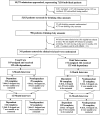Some medical inpatients with unhealthy alcohol use may benefit from brief intervention
- PMID: 19371494
- PMCID: PMC2670748
- DOI: 10.15288/jsad.2009.70.426
Some medical inpatients with unhealthy alcohol use may benefit from brief intervention
Abstract
Objective: Studies of alcohol brief intervention for medical inpatients have mixed results. We explored potential moderators of the effectiveness of brief intervention for unhealthy alcohol use among medical inpatients.
Method: This is a secondary analysis of a randomized controlled trial of brief motivational counseling among 341 urban-hospital medical inpatients (99 women) with unhealthy alcohol use. Self-reported main outcomes were receipt of alcohol treatment by 3 months in subjects with dependence and change in the mean number of drinks per day 3 and 12 months after enrollment in all subjects.
Results: Among subjects with dependence, the effect of brief intervention on receipt of alcohol treatment differed significantly by gender and age (p = .02 for each interaction). In stratified analyses, brief intervention was associated with receipt of alcohol treatment in women (adjusted odds ratio [AOR] = 3.9, 95% confidence interval [CI]: 1.2-12.7), and younger (<44 years) subjects (AOR = 3.6, 95% CI: 1.3-10.1). Among subjects with nondependent, unhealthy alcohol use, brief intervention was significantly associated with fewer drinks per day and better physical health-related quality of life at 3 months. However, among those with dependence, intervention was associated with worse physical health-related quality of life and more hospital use, and no changes in drinking. In adjusted analyses among those with and without dependence, brief intervention was not associated with mental health-related quality of life, alcohol problems, or readiness to change. Effects of brief intervention on consumption outcomes were not consistently moderated by demographic characteristics, comorbidity/health, or readiness to change.
Conclusions: Some medical inpatients with unhealthy alcohol use, particularly women, younger adults, and patients without dependence may benefit from brief intervention. Few factors that were expected to moderate brief intervention effects did so. Additional research should assess which medical inpatients, if any, can benefit from brief intervention.
Figures

References
-
- Adams WL, Yuan Z, Barboriak JJ, Rimm AA. Alcohol-related hospitalizations of elderly people: Prevalence and geographic variation in the United States. JAMA. 1993;270:1222–1225. - PubMed
-
- Andreasen NC, Endicott J, Spitzer RL, Winokur G. The family history method using diagnostic criteria: Reliability and validity. Arch. Gen. Psychiat. 1977;34:1229–1235. - PubMed
-
- Antti-Poika I, Karaharju E, Roine R, Salaspuro M. Intervention of heavy drinking: A prospective and controlled study of 438 consecutive injured male patients. Alcohol Alcsm. 1988;23:115–121. - PubMed
-
- Blanchard EB, Jones-Alexander J, Buckley TC, Forneris CA. Psychometric properties of the PTSD Checklist (PCL) Behav. Res. Ther. 1996;34:669–673. - PubMed
Publication types
MeSH terms
Grants and funding
LinkOut - more resources
Full Text Sources
Medical

